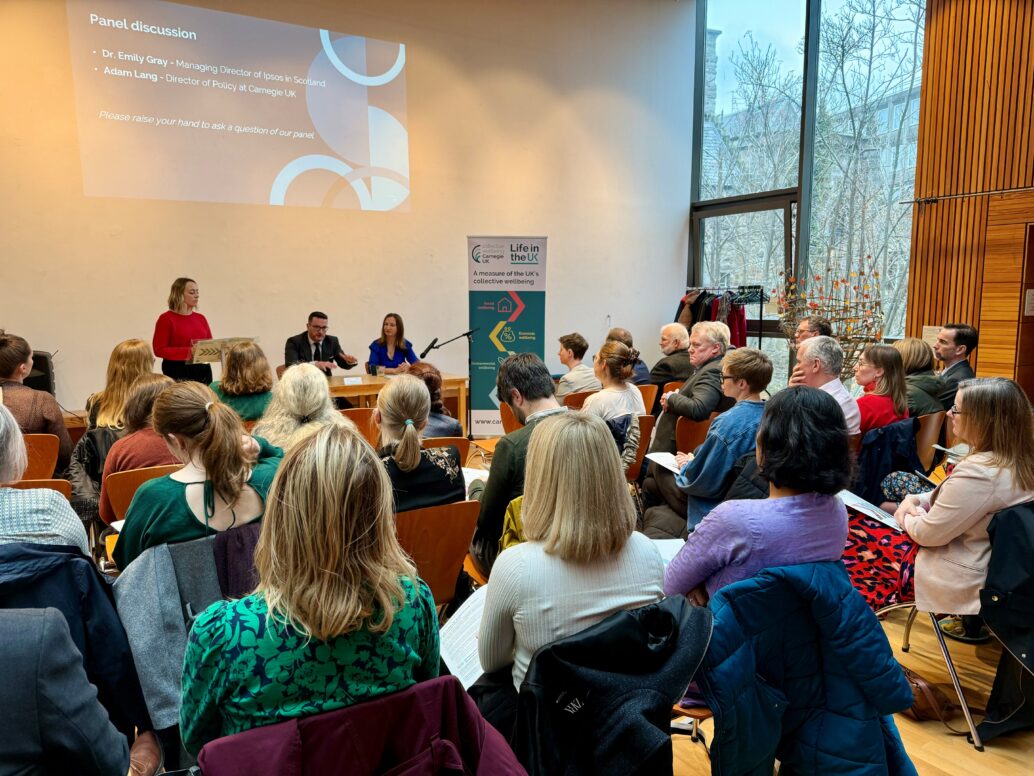Can Scotland change the story and become a leader in wellbeing again?

- by Hannah Paylor, Carnegie UK
- 8 November 2024
- 3 minute read
This week, Carnegie UK launched our 2024 Life in the UK: Scotland Index findings at the Storytelling Centre in Edinburgh, a fitting venue as we shared the collective story of what life in Scotland has been like for many since our initial research and publication in 2023.
In that time, Scotland witnessed the resignation of Humza Yousaf and the end of the Bute House Agreement, with John Swinney appointed as the new First Minister in May.
Once upon a time, it was possible to tell a story of Scotland as a rising star in terms of embedding an outcomes-based approach in policy. At Carnegie UK, we know that this is critical to the realisation of collective wellbeing.
Yet the collective wellbeing scores, which remain unchanged from those we reported in 2023, expose the fact that we are not seeing a consistent, comprehensive, and effective outcomes-based approach in practice.
What’s more, the evidence tells us that people’s experiences of life in Scotland vary substantially according to a range of factors. Our research uncovered:
- A 13-point gap between people on the lowest incomes (earning up to £27K), and people with middle to high incomes (earning between £52-100K).
- A 7-point gap between people aged over 55, and 16-34 year olds.
- A 10-point gap between disabled and non-disabled people.
These findings underline the reality as Scotland as a place where too many people don’t have their basic needs met.
So, what’s the story we want to be able to tell, and how do we shift the narrative?
Deliver a Wellbeing and Sustainable Development Bill
In the middle of a challenging financial environment, this legislation is the pragmatic option. That’s because it would better equip the Scottish Government to deliver on the “Peoples priorities” outlined in the Programme for Government, and hold public bodies to account in the improvement of outcomes.
Use the National Performance Framework as a tool to navigate and deliver change
The National Performance Framework was supposed to be a vision of social progress representative of Scotland’s citizens and the people that serve them.
During a time of emergency spending controls and saving measures, there is an opportunity to make better use of the National Performance Framework as a tool to navigate and deliver change.
Engage the people of Scotland in new methods of democracy
The evidence is clear that there is a lot of work to be done to rebuild trust in the people we elect to represent us. At Carnegie UK, we believe that there needs to be a bold new agenda to re-engage people in democracy.
We believe that the use of more participatory and deliberative processes (like citizens’ juries and panels) could make this happen, but importantly, they must be designed and delivered to a high standard, otherwise they risk alienating people further.
If, in the years to come, we want to be able to tell a story of improving living standards in Scotland then a good first step would be for the government to reclaim the agenda on an ambitious approach to putting wellbeing at the heart of decision making. We were once leaders in this field and can be again.
To find out more about how people in Scotland are living today, read our full report.
Help us make the case for wellbeing policy
Keep in touch with Carnegie UK’s research and activities. Learn more about ways to get involved with our work.
"*" indicates required fields
